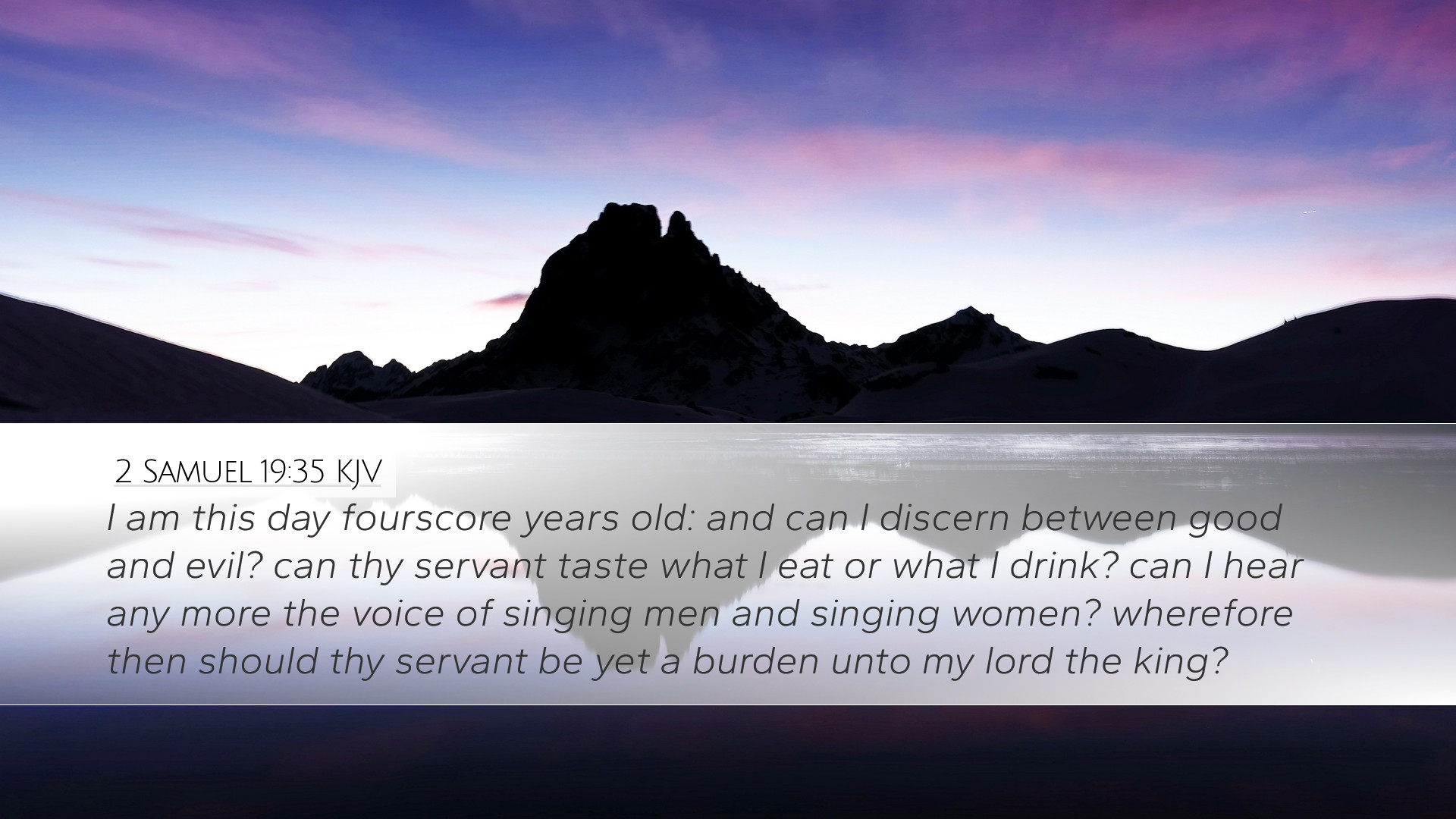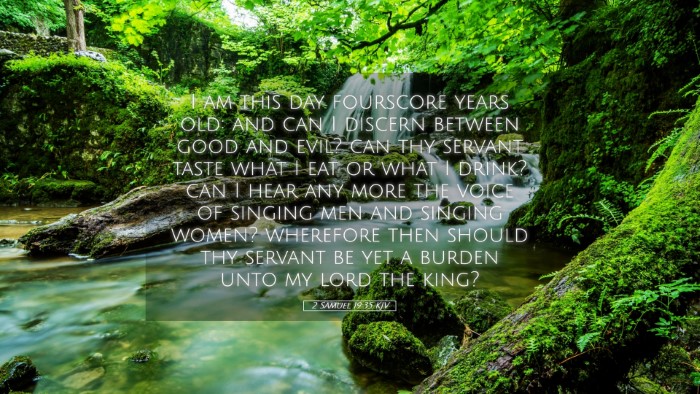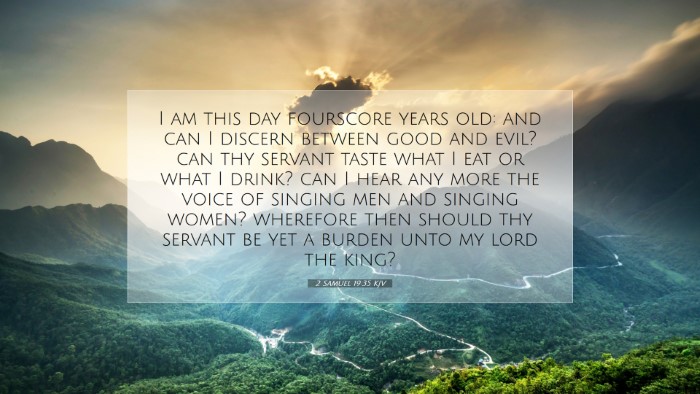Commentary on 2 Samuel 19:35
Verse Context: 2 Samuel 19:35 states, “I am this day fourscore years old: and can I discern between good and evil? can thy servant taste what I eat or what I drink? can I hear any more the voice of singing men and singing women? wherefore then should thy servant be yet a burden unto my lord the king?” This verse encapsulates the reflections of Barzillai, an elder statesman and loyal supporter of King David, as he addresses David upon the king’s return to Jerusalem after Absalom’s rebellion.
General Observations
This verse paints a poignant picture of the aging Barzillai as he contemplates his own limitations and contributions. His words reflect both wisdom and humility. It serves as a reminder of the frailty of human life and the inevitable decay that accompanies old age.
Insights from Commentators
-
Matthew Henry
Henry emphasizes Barzillai’s acknowledgment of his old age and declining capabilities. He notes that Barzillai's self-reflection reveals a deep understanding of the changes in his physical and mental faculties, as he questions his ability to engage with the vibrancy of life around him.
Henry comments that Barzillai's candor illustrates a wisdom borne from a life of experience. His question about discerning good from evil signifies a recognition that as one ages, the ability to navigate life's complexities wanes. It reflects the humility of recognizing one's limitations while bearing in mind the need for continued service unto God and His appointed leaders.
-
Albert Barnes
Barnes offers a detailed exposition on Barzillai's considerations about his age. He interprets Barzillai's rhetorical questions as evidence of a clear mind and understanding. Rather than seeking glory or honor, Barzillai prioritizes his practical contributions, realizing that mere presence without the ability to serve effectively may not be beneficial for the king.
He points out that Barzillai’s refusal to burden David further allows for an environment where younger leaders can step up. This selfless act underscores the virtue of humility and loyalty, presenting Barzillai not only as a hero in David’s narratives but also as a model of dignity in old age.
-
Adam Clarke
Clarke’s analysis delves into the emotional undertones of Barzillai's statement, highlighting that age brings with it a profound awareness of mortality. His reflections resonate with all who contemplate their contributions and legacies as they approach the end of their earthly journey.
Additionally, Clarke points out that the rhetorical nature of Barzillai’s questions serves as an invitation for reflection among the listeners. He emphasizes the importance of recognizing one’s life stage while also valuing the moments of service one has been able to provide in the past. He speaks to the dignity inherent in recognizing when one should pass the mantle to others.
Theological Significance
This verse reveals significant theological principles related to life stages, service, and divine purpose. Barzillai’s remarks can lead us to consider how the aging process is seen within the frameworks of Scripture:
-
Recognition of Human Limits:
Barzillai serves as a reminder that human life is transient, and we are called to acknowledge our limitations—theologically, this can relate to our dependence on God's strength rather than our own.
-
The Gift of Wisdom:
As one ages, the wisdom and experience gained over time can be invaluable to younger generations. Barzillai’s insights pose questions about how older individuals can continue to influence society positively, even if their physical capabilities have diminished.
-
Service Over Recognition:
The heart of Barzillai’s speech goes beyond seeking recognition; it revolves around the desire to serve God and His kingdom faithfully until the end. This mirrors the biblical call to be faithful stewards of the gifts and resources entrusted to us.
Application for Modern Readers
Pastors, students, and theologians can draw essential lessons from Barzillai’s humble admission:
-
Embrace Aging:
We are called to embrace each life stage as valuable and significant. Rather than retreating due to limitations, individuals can find ways to adapt and continue their service.
-
Encourage Generational Collaboration:
The respect for elders and collaboration with younger generations should be cultivated within faith communities, allowing for wisdom to guide the passionate energy of youth.
-
Assessment of Ability:
It is essential to evaluate one's abilities honestly and prioritize ways to contribute to the community that align with these capabilities.
Conclusion
2 Samuel 19:35 provides profound insights through Barzillai’s reflections. His candidness about age and service inspires modern readers to grapple with their longevity and value in God's divine narrative. The wisdom inherent in accepting the limitations of age while engaging in selfless service lays a rich foundation for pastoral care and collective church life. Barzillai's voice continues to echo, urging us toward humility, wisdom, and a commitment to the greater good beyond ourselves.


